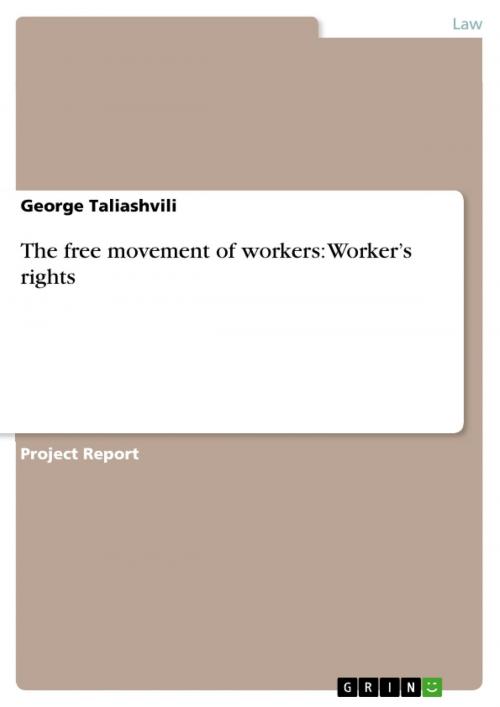| Author: | George Taliashvili | ISBN: | 9783638070829 |
| Publisher: | GRIN Publishing | Publication: | June 30, 2008 |
| Imprint: | GRIN Publishing | Language: | English |
| Author: | George Taliashvili |
| ISBN: | 9783638070829 |
| Publisher: | GRIN Publishing |
| Publication: | June 30, 2008 |
| Imprint: | GRIN Publishing |
| Language: | English |
Project Report from the year 2008 in the subject Law - European and International Law, Intellectual Properties, grade: B, University of Bremen, course: Single Market, 5 entries in the bibliography, language: English, abstract: Preview My homework aims to elucidate the principles of free movement of workers and to give a small review on the provisions of EC treaty concerning to the worker's rights and some exceptions regarding the freedom. After the world war two the Europe was periled: it was disjointed, the economies of majority European countries were devastated and the contravention of the equipoise in Europe menaced it to face the upcoming economical and political catastrophes in region, the situation acquired immediate handicapping, betimes the idea how to resolve problems and the remedy of the situation arose in Sir Winston Churchill's words: 'Recreate the European Family or as much of it as we can and provide it with a structure under which it can dwell in peace in safety and in freedom. We must build a kind of United States of Europe' and this words stimulated the main European countries to establish the 'European United States' another 'land of opportunity', without borders and with much more opportunities and capacity to achieve a better life. In 1957 was signed the Treaty of Rome which laid the essential legal foundations for European Committee. After the establishing the European Committee its main tasks regarded to the achieving the high point of standard of living and economical expansion, for further development of mentioned tasks the Internal Market was subsisted by the EC treaty provisions which was the incarnation of Sir Winston Churchill's idea and significant tool of economic integration, no boarders, no custom duties and the abolition of barriers to the free movement of goods, services, workers and capital within the member states known as the 'four freedoms', was the great step towards the European consolidation.
Project Report from the year 2008 in the subject Law - European and International Law, Intellectual Properties, grade: B, University of Bremen, course: Single Market, 5 entries in the bibliography, language: English, abstract: Preview My homework aims to elucidate the principles of free movement of workers and to give a small review on the provisions of EC treaty concerning to the worker's rights and some exceptions regarding the freedom. After the world war two the Europe was periled: it was disjointed, the economies of majority European countries were devastated and the contravention of the equipoise in Europe menaced it to face the upcoming economical and political catastrophes in region, the situation acquired immediate handicapping, betimes the idea how to resolve problems and the remedy of the situation arose in Sir Winston Churchill's words: 'Recreate the European Family or as much of it as we can and provide it with a structure under which it can dwell in peace in safety and in freedom. We must build a kind of United States of Europe' and this words stimulated the main European countries to establish the 'European United States' another 'land of opportunity', without borders and with much more opportunities and capacity to achieve a better life. In 1957 was signed the Treaty of Rome which laid the essential legal foundations for European Committee. After the establishing the European Committee its main tasks regarded to the achieving the high point of standard of living and economical expansion, for further development of mentioned tasks the Internal Market was subsisted by the EC treaty provisions which was the incarnation of Sir Winston Churchill's idea and significant tool of economic integration, no boarders, no custom duties and the abolition of barriers to the free movement of goods, services, workers and capital within the member states known as the 'four freedoms', was the great step towards the European consolidation.















